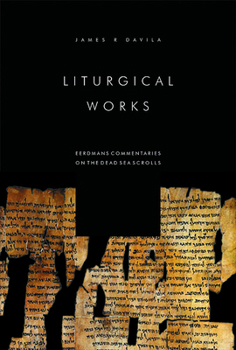Liturgical Works
Among the invaluable manuscripts of the Dead Sea Scrolls are numerous fragments of liturgical texts pertaining to the ritual life of Jews living around the turn of the common era. These fascinating writings include prayers for annual festivals, a covenant renewal liturgy, a mystical liturgy for Sabbath sacrifices, a grace ceremony for mourners, daily and weekly prayers, liturgies of purification, and perhaps even a wedding ceremony. In this volume, the first to be published in the Eerdmans Commentaries on the Dead Sea Scrolls series, James Davila introduces, translates, and provides a detailed exegesis of these important documents. The book begins with a general introduction to the Qumran library and Jewish liturgical traditions. Davila then provides an introduction, translation, notes on the original Hebrew, and line-by-line commentary for each of the Qumran liturgical works. Davila's excellent translation work combines overlapping fragmentary manuscripts into a single, smoothly flowing text, and his commentary includes numerous fresh insights and observations on these writings. Giving full attention to parallel texts found in the Hebrew Bible and other Jewish and Christian writings through late antiquity, Davila firmly situates the Qumran liturgical works in their historical context in Second Temple Judaism and discusses their significance as background to the Jewish liturgy, Jewish mysticism, and Christian origins. Shedding light on a period of Jewish history whose ritual life formerly lay almost entirely in darkness, this volume makes--and subsequent ECDSS volumes will make--a valuable contribution to our understanding of the biblical world.
Format:Paperback
Language:English
ISBN:0802843808
ISBN13:9780802843807
Release Date:February 2001
Publisher:William B. Eerdmans Publishing Company
Length:349 Pages
Weight:1.18 lbs.
Dimensions:1.0" x 6.2" x 9.2"
Customer Reviews
1 rating
Holy Works...
Published by Thriftbooks.com User , 22 years ago
I picked up this book, and discovered that it is the first in a planned series of a 16-volume commentary on the Dead Sea Scrolls. It is published (and the series is supported) by Eerdmans, a major publishing house in the area of theology, biblical studies, and religious topics. Each of these volumes will follow the pattern of combining expert commentary, translations, and critical notes for texts found among the Dead Sea Scrolls. Their goal is to have a line-by-line commentary for every translatable manuscript. James R. Davila is a lecturer at the University of St. Andrews in Scotland. He is part of the international team responsible for assembling, translating and publishing the Dead Sea Scrolls. He has published many of the Qumran manuscripts of Genesis and Exodus, and is an expert in early Jewish studies. This book is an interesting first-in-the-series -- one might have expected something a bit more dramatic, or something biblical, or something apocalyptic, to grab the attention of readers with the first volume. Instead, we begin the series (despite the fact that this is, sequentially, volume no. six) with prayers and worship practices -- a fitting beginning to what promises to be a great series. --Introduction-- The introduction provides a brief overview of the Qumran Library and the liturgical texts included in that collection. Discovered largely in the late-1940s to the 1960s (with the occasional discovery continuing to be made), the scrolls include many different kinds of writing -- biblical texts (transcribed and paraphrased), community instructions and rules, apocalyptic religious texts, psalms, hymns, and liturgical texts. `The main criterion for inclusion [in this book] is that the text show evidence of composition for use in the ritual life of ancient Judaism, whether pertaining to the cycle of festivals and holy days, to daily prayer in various situations, to ceremonial purification, or rites of passage such as marriage.' Certain key concepts are important in liturgical texts, and these include the ideas of cultic practice, maintenance of covenant relationship, and purity. By cultic practice, we mean any kind of worshipful rituals used in religious tradition. Covenant and purity were of considerable importance in the Torah and other early religious practices/writings, but these were brought to a heightened sense of importance by the community at Qumran. Davila discusses the controversies surrounding the reconstruction of a sense of calendrical cycles of ancient Israel, as well as the impact of these texts and the practices that surround and incorporate them in later Jewish liturgies. Texts important for consideration here include the Mishnah, the Jerusalem Talmud, the Babylonian Talmud, Jewish liturgical poetry, and Hekhalot literature. --Scrolls-- The Dead Sea Scroll texts covered in this book include: - Festival Prayers - Berakhot - Songs of the Sabbath Sacrifice - Times for Praising God - Grace after Meals - A Lamentation - A Wedd





